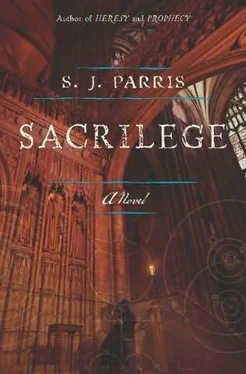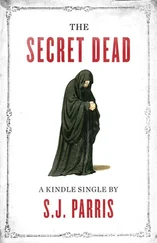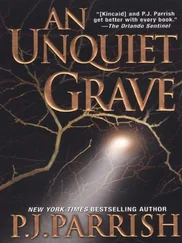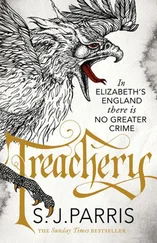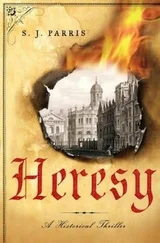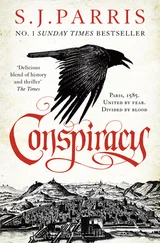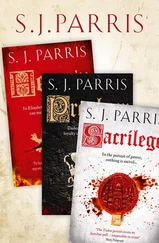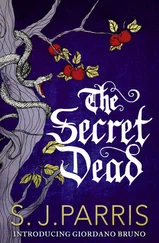“I am certain he was killed by someone he knew. It shouldn’t be impossible to find that person—I would wager any amount that he is still here in Canterbury.”
“Don’t wager too much, Bruno, you will be penniless at this rate.”
“I know it.” I laughed softly and placed my hands on her thin shoulders.
“I just want it to be over,” she whispered. “You understand.”
“I will move heaven and earth to find this man for you, Sophia, if it is in my power. I have said I will.” I placed a finger under her chin and gently tilted her face upwards to me. For a moment, as she looked me directly in the eye, I thought I glimpsed her with her defences down, open and vulnerable.
She nodded without speaking, and her lips parted slightly; a pulse quickened in my throat. Almost imperceptibly, I felt her fingers tighten on my arms as the space between us seemed to grow smaller; before I had time to think of the consequences, I found myself leaning towards her, my mouth barely an inch from hers, and to my surprise she did not turn her head or pull away. For an instant I felt her breath warm on my chin, then the door opened. Olivier slipped into the room, his scornful expression for once seeming justified.
“Pardon me,” he said drily, in French. “My father says you are talking too loudly. He is afraid the women downstairs will hear you.” He was looking at Sophia; she lowered her eyes, and let go of my arms.
“Over the sound of the looms?” My anger at the interruption was hot in my voice. I wondered if he had been listening at the door. He merely returned my look, naked dislike in his eyes, and I saw, whatever Sophia might say about their friendship, this boy regarded me as a rival. The thought gave me a small stab of joy. I forced a smile.
“I should be leaving. I will return tomorrow, I hope with more news.”
“Must you go so soon, Bruno?” Sophia raised her eyes to me, but I could not read her look.
“I have work to do, remember?” I made a playful bow in her direction and she smiled. Olivier sucked in his cheeks.
“How long do you expect us to keep her?” he hissed, as I reached the door.
“I don’t know.” Despite everything, I felt sorry for him. “Until I find who murdered her husband. I hope not too long.”
“It was the son. It’s obvious.”
“If it’s obvious, why haven’t you told the authorities?”
He responded with a laconic shrug.
“You think they would listen to me? He’s the son of a magistrate. It’s easier to blame a woman, a foreigner, a refugee, anyone who doesn’t have a voice to argue. It is up to you to find the evidence before they will listen. She says you have a gift for this.”
“I’m doing my best,” I said icily.
But his words made me uncomfortable; I recalled the constable’s casual reference earlier to arresting some itinerant—as if it hardly mattered whom—for the murder of the apothecary. Olivier was right; justice here was a cursory affair, dependent upon whether you happened to be in the wrong place with the wrong face or accent. My fingers rested on the purse at my belt, where I had tucked the scrap of burnt paper with the notes from Paracelsus. Leave it, I told myself sternly. What matters is to prevent Sophia being wrongly condemned; you are not responsible for what the law does to anyone else. And yet I could not shake a sense that I ought to do something.
“Then do your best faster,” Olivier replied. “My parents are terrified she will be found. Who can blame them?”
I could not find an adequate reply to this, so I nodded curtly and took one last look at Sophia before I opened the door. She met my eye only briefly and then her gaze skittered away to the window. I wondered if she regretted the fact that she had nearly kissed me, or that Olivier had seen us, or both.
Reluctantly I closed the door to the attic room but paused on the stairs for a moment, my head bent under the low rafters, hoping I might hear some of their conversation. Behind the door there was only silence.
I was distracted by a discreet cough from below; I looked down and saw Olivier’s father, waiting at the foot of the stairs to show me out.
Though Monsieur Fleury checked that the lane outside the weavers’ cottages was empty before allowing me out, I walked into the High Street with a sense of unease; it seemed I was picking up the fear that saturated that house. Without any clear idea of what to do next, I found myself turning in the direction of the cathedral. I decided to call on Harry Robinson, to see if he had heard the news of the apothecary’s murder and what he made of it. It was not yet nine. Outside the shop, a small crowd was still gathered, whispering with relish, hands clasped to scandalised mouths, the goodwives thoroughly enjoying this latest episode of town drama. I hurried past, keeping my head down, though no one paid me any attention. I noticed the girl Rebecca was no longer among them.
Who killed Sir Edward Kingsley? I half smiled to myself at the memory of Sophia quoting William of Ockham at me, as if she were the philosopher. I was fairly certain she could not share those jokes with Olivier; at least I had that on my side. If I had learned anything in the past couple of years, it was that the obvious solution was often far from the truth. She wanted me to find Nicholas Kingsley guilty of his father’s murder; it would be a neat solution, certainly, and a chance for revenge on a young man with few redeeming qualities. But to assume his guilt from the beginning would make me no better than Constable Edmonton, with his talk of rounding up vagrants.
Sophia. Damn her, damn her eyes and her mouth and her throat and the curve of her hip and everything else she could not disguise. What was I doing here? I should be in London, among my books, not miles away in a strange city, regarded with suspicion and hostility and mixed up in murders that had nothing to do with me. I, who had always prided myself against the weaknesses of the heart; how often I had mocked or pitied other men who had allowed themselves to be distracted from the pursuit of knowledge by delusions of love. On the one occasion, during my stay in Toulouse, when I had grown to love a woman I could not have, I had made a decision and left for Paris one night without saying goodbye, rather than staying to waste my time and hers in useless pining. How, then, had I allowed myself to fall under the spell of Sophia? Beauty, yes, but I had seen beauty many times before and resisted it. Perhaps it was a kind of recognition; I had seen in Sophia, even from our first meeting, a searching intelligence, a refusal to accept what she was told merely because it had always been so. She and I wanted the same thing: independence, the right to choose our own path and to ask questions, and we had both been born to a station in life that kept such freedom out of reach. Perhaps that was the root of my feelings for her; she reminded me of my younger self. The thought prompted a hollow laugh; was that not the ultimate vanity? “ Sciocco ,” I told myself, under my breath, bunching my right hand into a fist until the nails dug into my palm, as if the pain would bring me back to my senses.
In the Buttermarket, crowds gathered around the stone cross and the horse trough in the centre of the cobbles, the formidable towers of Christ Church gate casting their shadow across the coloured awnings of the market stalls. There was a great deal of animation in the buzz and hum of conversation, the townspeople clearly stirred up by the excitement of another killing in their midst.
Tom Garth stood solid as a stone column in his alcove under the gatehouse arch, arms folded across his broad chest. His expression when he saw me was even more hostile than it had been the day before, yet he nodded me through, holding out his right hand.
Читать дальше
Конец ознакомительного отрывка
Купить книгу
